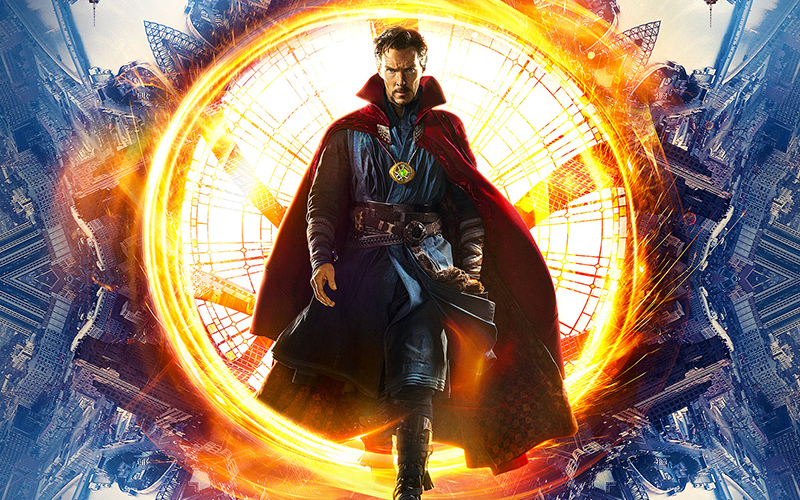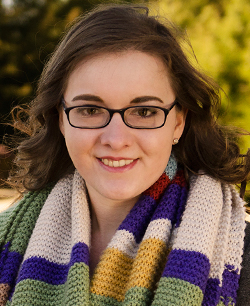I was never allowed to read Harry Potter when I was a kid and I still have never seen any of the movies or read any of the books to this day. I don't think less of the people who do; I don't know a lot about them so I don’t really have an opinion. The basic principle in my mind has been that Harry Potter is too close to something that is both real and damaging: sorcery. It perhaps isn’t real, actual sorcery in itself, but for young or malleable minds it might point them toward what is considered by the Bible to be both dangerous and an abomination. That's my two cents at least.
However, I'm also a lover of fantasy, but I am very cautious about the fantasy I consume. Anything that seems occultic I try to avoid. Which leads to my curious experience of going to see Doctor Strange. When I saw the first trailer, my initial reaction was "Oh no. I won't be going to see that. That's like sorcery and witches and stuff." As the months drew on and more and more information about the plot came out, the story seemed more science fiction with a mix of fantasy, which being an avid Star Wars fan, I don't have a problem with. Many of the Christian review sites seemed to fall on one of two sides. Either the film was demonic and a horrible introduction to the occult or it was like the Matrix with good biblical principles amidst questionable content.
Well now after seeing it I can tell you that it is more of the latter with a heaping scoop or two of the prior.
Doctor Strange tells the story of Dr. Stephen Strange and his "Tony Stark-ish" arc from arrogant neurosurgeon to humbled Sorcerer. Benedict Cumberbatch portrays what I would call an American version of his iconic Sherlock persona: arrogant, overly confident, and rude. But his world comes crashing down when he decides to text and drive leading to a horrific accident that ruins his precious hands that made him an amazing surgeon. After modern medicine fails him, he hears about a man who was healed after visiting a place in Nepal. Stephen travels there only to find some mystical mumbo jumbo purported by a woman called "The Ancient One." At first, he gawks at the concept of anything spiritual, but after the Ancient One gives him a trippy vision of the astral plane and other dimensions, Stephen Strange is a bit more open to what he would previously never consider.
APPLICATION
Doctor Strange is your classic hero's journey. After being humbled to the point of begging at the Ancient One's door, he is able to see there are things far greater than his cushy rich life had offered before. Selflessness is a big theme in this movie. "It's not about you," the Ancient One tells him as she implores him to let go of his pride. Along his journey, Stephen is humbled, apologizes for his wrongs, and seeks to make things right with the people he was cruel toward.
Yet, even in the midst of learning to be a sorcerer, Stephen cheats a bit. This turns out to serve the greater good in the end, but another character warns that the ends do not justify the means and that there are consequences for bending the rules. *Spoilers* In the end Stephen is willing to sacrifice himself to save humanity.
CONTENT
As I was watching Doctor Strange, I was trying to think of what a literal alternate title for the film might be. I've concluded that it would have to be "Inter-dimensional Matrix ninjas vs the stereotypical baddies who want to cleanse the world by destroying it." Though the concept of magic that the "sorcerers" in this film employ (including but not limited to astral projection, out of body experiences, opening portals to other places on earth and other dimensions, casting spells, and drawing power from dark forces), the "magic" in this film feels more Matrix-y in my opinion. The Ancient One explains to Stephen that their band of sorcerers protects the world from mystical threats by drawing power from other dimensions in the multiverse. She describes their spells as being more like command codes on a computer, with techniques and skills that can be learned to generate weapons, travel through portals, and manipulate reality. Many objects also possess magical qualities like Stephen's sentient cloak (one of my favorite characters in the movie).
However, all of this source code-ish magic is heavily steeped in eastern mysticism, which is what may give viewers pause. Like I mentioned above on my standards concerning Harry Potter, the magic in the movie does reference many real practices and concepts of eastern religions like meditation, chakras, occultic/eastern symbols, and spiritual healing which may be too close to the real thing for many Christians to tolerate.
The main villain of the film, Kaecilius, believes that Dormammu, a dark entity from a place called "the dark dimension," can give eternal life. Thus he and his followers wish to open up earth to this dark place and free all humans from time. Kaecilius and his followers appear to have the mark of Dormammu on their foreheads as they attempt to summon the aforementioned darkness in a scene that has the most occultic vibes of them all. It is also revealed that another character has been drawing from Dormamu's power to extend their life, a morally questionable choice that is glossed over and never addressed well in my opinion.
There is a bit of PG-13 language in this film as well as an allusion to Stephen’s girlfriend sleeping with another doctor.
In ways of violence, this Marvel film probably has the lowest body count in all of the MCU. One man is beheaded off camera (we see his shadow as his head is taken off). Lots of kicks, punches, and hand to hand combat takes place. Many characters fall from great heights and one falls to their death striking a city street below. Being a doctor, Stephen does not want to kill anyone and the one bad guy he does kill in self-defense shakes him to the core. Quite a few people are stabbed with blades generated out of thin air. We see several scenes involving surgery, which include bloody gauze and stitched up wounds. Stephen also takes quite the beating in his car accident (don’t text and drive kids).
This film also features the destruction of Hong Kong…in reverse. We see buildings collapsing back together and several people come back to life from being stabbed, crushed, or in car accidents. *Spoilers* Stephen travels to the dark dimension to make a deal with Dormammu. His leverage: Stephen is bound by time and traps them both in a time loop that resets every time Stephen is killed. We watch him be vaporized, impaled, and crushed over and over again.
CONCLUSION
When I was a kid, my parents were always attentive to communicate to me the separation of reality and fantasy in entertainment. My friends and I played "Star Wars" many a time, but we always knew the Force and the Jedi were not real. It was a fantasy set in a fantasy world.
Doctor Strange is similar, though perhaps a bit too close to home. Stephen and his fellow sorcerers resemble Jedi, but instead of being in a galaxy far, far away, these sorcerers are set in our own world and in real places where some people actually practice some of the things they do. I will admit that the amount of astral projection and spell casting made me a bit uneasy and I would completely understand those who wish to stay away from this film (I wouldn’t take my kids to see it). But as a mature believer, I was able to look past that and draw from a fun and entertaining story of a man who finds meaning in selflessness rather than selfishness.
Let me be clear: I enjoyed Doctor Strange.It was well written, entertaining, and a wonder to behold (not to mention Benedict is exceptional in this role). However one cannot deny the questionable basis for much of the source material. My advice to Christians is to always be aware of what we are watching and remember to not put down those whose convictions lead them to avoid such tales of magic and psychedelic manipulation.
For me, the most applicable takeaway came from one of the final shots of the film. Stephen has saved the day and is now head of the Sorcerer Sanctum in New York City. As he stands at the window viewing the NYC skyline, he looks down at his hands, still scarred and shaky from his accident. "After all that trouble he didn't get what he wanted," I thought to myself. But then it occurred to me… he got something better: what he needed. How true that is in our Christian walk! We often seek to hold our lives together the way we want but our plans are finite and limited. God’s plans are always better than ours and, like Stephen Strange, sometimes it takes the collapse of all we put our worth in to show us that truth. Life isn’t about us. It isn’t about magic or spells either. It’s about Christ.






